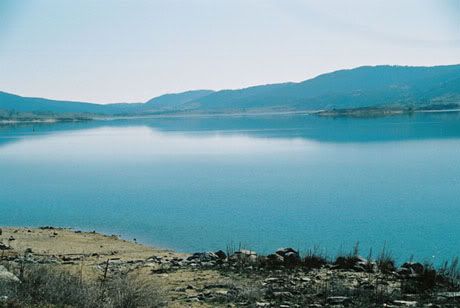I wonder if you heard the news recently of the couple, who in order to evade paying £120 for two speeding fines, decided another course of action. They told police it was a colleague who was driving the car at the time of the speeding incidents, and that this "other" man had returned to his native country of Bulgaria. When they realised that the police were probably not taking their story seriously, the wife then flew to Bulgaria and sent back to England a postcard, from this fictitious colleague, supporting their story. To cut the story short, the police became suspicious, the couple went to court and were found guilty, and subsequently fined £11,000. In summing up the case, a police constable said "The reality is that they could have told the truth from the outset, paid their £120 fines and had their licences endorsed with three penalty points each." The truth won out.
Or take our esteemed Prime Minister Tony Blair, who despite his friend and colleague, David Blunkett resigning from the Cabinet after breaking ministerial rules, proclaimed Mr Blunkett left with "no stain of impropriety whatsoever". In this case, Mr Blair is seemingly oblivious to the truth of the matter. Where is the integrity?
When we are shopping and we notice that the cashier gave us the wrong change, we advise them of their mistake. We check the receipt and what is in our hand, and the cashier gives us the correct change. So mathematically there is truth. Scientifically there is truth. Gravity prevents us from floating off into the atmosphere, regardless of our wanting to flap our arms and fly like a bird.
Think of the worst thing in the world for you - something that is totally abhorrent to you. That shows you have some sense of values and what is right and wrong. It is intrinscally wrong for events such as 9/11 in New York and 7/7 in London to occur. Is that too far away for you to be bothered by? How about when you are coming home late at night, and are mugged and your handbag or wallet are stolen. Do you not feel a sense of anger towards those who committed that crime against you? When I was mugged 12 years ago in London, those were the feelings I had. It is natural to be indignant and angry at those who perpetrate crimes against your personal values. Ergo there is such a thing as truth - both personal and universal, and both raise our hackles up when they are impeded or broken.
Now, if there is truth mathematically, scientifically, personal and universal, what more can we say? Can you imagine a world, where none of those exist? Where there is no mathematical, scientific, personal or universal truth? I can. We are starting to reap the results of "relative truth". The schoolgirl stabbed repeatedly in the face with scissors by somebody else whilst queuing up at the school canteen bears this out. If everything is relative, then chaos is the end result of relative truth. Can you, in the words of John Lennon, "Imagine there's no heaven, its easy if you try..." I can. Want to imagine a place without heaven? Just look to the former Soviet Union, particularly under Stalin, where millions were slain in the name of atheism. Or look to China under Mao, where at least seventy million were slain in the name of atheism. Look at the nation of North Korea if you want a more modern representation of an atheist state. Atheism and agnosticism have no answer, despite the silky lyrics of John Lennon. At least here in England, we have a heritage of Christianity to be inordinately thankful for. Without it, there wouldn't be the freedoms we enjoy, the scientific discoveries proclaimed, nor the rich vein of history that covers this land. And yet, so many still ask "Is there any hope?"
Well I believe there is, and at Christmas time, it is a time for both joy and hope. Two thousand years ago, God visited this planet in the form of the baby Jesus. But he didnt remain in the cradle, but rather grew into a man, full of grace and humility, only to die at the hands of the religious people. If that was all, we would never have heard any more about him. Jesus defied all, and came back from the dead, a fact attested to both by individiuals and groups. This man Jesus, was born so that we might have the joy and hope of a brighter future. In my own experience, the man Jesus has given me that. Not only was he human, but he was also God at the same time. That is amazingly mind blowing when you think of it. Why not check the facts out objectively for yourself this Christmas, and find Jesus for yourself so you too can share in the joy and hope He offers. He wont let you down just as He hasnt me. He never has and never will do - that is His promise to me and also to you if you acquiesce to His will.

